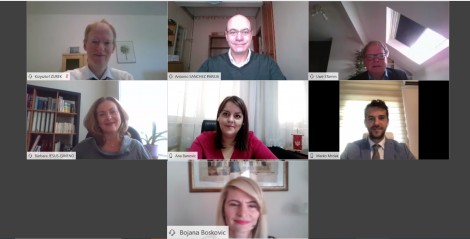The Montenegrin Government took timely measures to mitigate the consequences of the economic crisis caused by the coronavirus pandemic, along with the support of the European Union, it was assessed at today’s Subcommittee Meeting on Economic and Financial Issues and Statistics.
At the 13th meeting of this Subcommittee meeting between Montenegro and the European Union, which was held online and covers economic, fiscal and financial developments and challenges as well as policy areas under Negotiation Chapters 17, 18, 32 and 33, the representatives of the Montenegrin competent institutions informed the EC representatives about the activities carried out in the previous period in these areas.
Deputy Chief Negotiator Marko Mrdak pointed out that, in addition to the annual report of the European Commission, the Economic and Investment Plan is very encouraging in terms of socio-economic recovery from the pandemic.
“We interpret this as a sincere commitment to the Western Balkans, which was clearly announced at the beginning of the current EC mandate. “We firmly believe that this plan will encourage recovery and economic growth and that it will support reforms in the continuation of our path towards the EU,” he stated. Mrdak thanked the EU for the 30 million euro macro-financial assistance, noting that the Montenegrin side is aware of the remaining conditions that need to be met to ensure payment of the second tranche in the same amount.
He informed his interlocutors with the activities in the chapters covered by the Subcommittee, including the Economic Reform Program 2020-2022, the Annual Plan of Official Statistics for 2020, the Consolidated Report on Governance and Internal Controls in the Public Sector for 2019, as well as the 2020 Montenegro Budget Law.
The Head of the Unit in the Directorate General for Economic and Financial Affairs, Uwe Stamm, commended the Montenegrin Government for the rapid adoption of measures to mitigate the impact of the crisis, and assessed that the COVID-19 pandemic had struck hard the Montenegrin economy. He stressed that as the crisis develops, the policy response and its adequacy needs to be properly assessed and adjusted if needed, to ensure that the support provided to businesses and citizens is well targeted and effective. “The crisis has taken a heavy toll in the area of public finances as well – falling revenues and higher spending have led to larger deficits. This is an inevitable side effect of saving jobs, turnover and income. At the same time, a return to prudent fiscal governance once the economy recovers is essential to preserve fiscal sustainability, ”he stated.
Deputy Head of the Montenegro Unit at DG NEAR, Neighbourhood and Enlargement Negotiations, European Commission, Barbara Jesus-Gimeno, encouraged Montenegro to use the coming months to accelerate reforms, so that the country can continue to progress on the path to EU membership. “Addressing these priorities will require close inter-institutional coordination, functional public administration and building on the results achieved over the past years,” she added.
GENERAL SECRETARIAT OF THE GOVERNMENT OF MONTENEGRO
SECTOR FOR INFORMING THE PUBLIC ABOUT THE EU AND THE EU ACCESSION PROCESS


